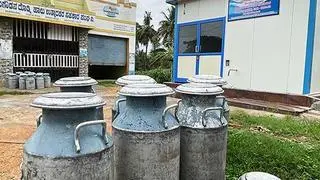The cashew kernel market witnessed some business last week in a wide price range depending on processors, but amid limited activities.
Business was done for W240 from $4.30 to $4.40; W320 from $3.80 to $3.95; SW from $3.60 to $3.75; Splits from $3.30 to $3.40; Pieces from $3.20 to $3.25 (fob). Most of the business was for nearbys as there was fair interest for third quarter shipments at the lower end of the range but the processors from whom the buyers want to buy forwards are not willing to discount market to get forward orders.
Raw Cashew Nuts (RCN) were also being offered and traded in a wide range, depending on quality and terms. Price ranges were Ivory Coast (IVC)-Ghana from $1,275 to $1,375 a tonne (c&f), Benin from $1,325 to $1,400 a tonne (c&f), Senegal-Gambia from $1,450 to $1,500, Guinea Bissau from $1,500 to $1,600 a tonne (c&f).
Price range and fluctuations are wider than normal and this is likely to lead to more problems than usual, trade sources in Mumbai said.
Movements from all origins are expected to pick up in May and bulk of West Africa RCN will arrive in India and Vietnam from mid June to October (i.e., about 2-3 months later and spread over a longer period than normal). As discussed earlier, this delay will mean lower kernel yields, they said.
It seems that for the next 3-4 months, the kernel market will continue to see periodic dips and spikes in activity and prices — but the price movement is expected to be in the current range. Quiet period may bring out lower offers from some processors but the underlying buying interest, as most buyers are operating on short term covers, “will provide support to the market. Also, the strong Euro + GBP + AUD and some other currencies (vs the USD) mean that current kernel prices are close to the mid 2010 levels for these markets,” Mr Pankaj N. Sampat, a Mumbai-based dealer, told Business Line .
Reduced processing in March-June will mean that thin kernel pipeline will continue till July or maybe even August and this will keep prices in the current range unless there is a long quiet period in May-June. This seems unlikely since the pattern of short-term buying means that some buyers will always need to buy — even though quantities they cover at any given time may be limited. If there is a big drop in retail off-take in the US and EU in first half, buyers may be able to delay (or reduce) their buying for later deliveries as existing cover may last longer.
Good Asian demand from mid or late May for Indian marriage season followed by festivals and Ramadan in West Asia-North Africa, will mean there will be regular buying for spot and nearbys, he said.
Overall, the trade feels that if the RCN prices do not come down significantly in May-June, there are very little chances of any big decline in kernel prices for 2011 shipments. If the RCN prices do not come down, any dip in kernel price below the current range should be a buying opportunity to cover a larger portion of 2011 needs, he added.








Comments
Comments have to be in English, and in full sentences. They cannot be abusive or personal. Please abide by our community guidelines for posting your comments.
We have migrated to a new commenting platform. If you are already a registered user of TheHindu Businessline and logged in, you may continue to engage with our articles. If you do not have an account please register and login to post comments. Users can access their older comments by logging into their accounts on Vuukle.